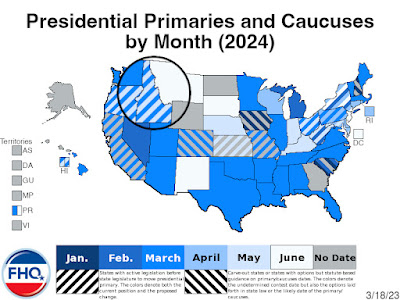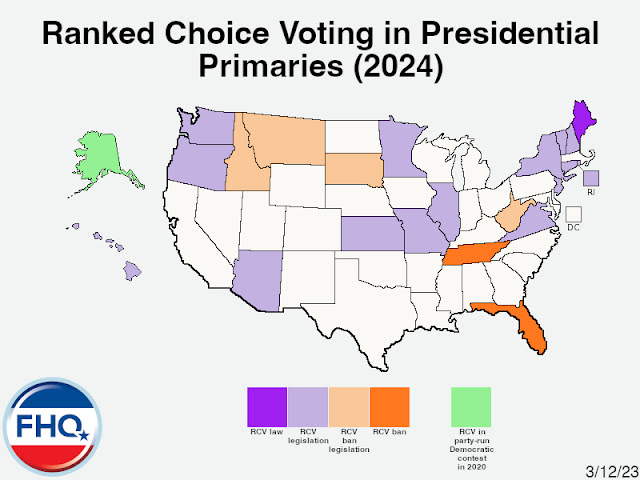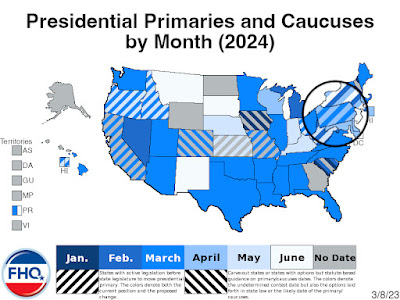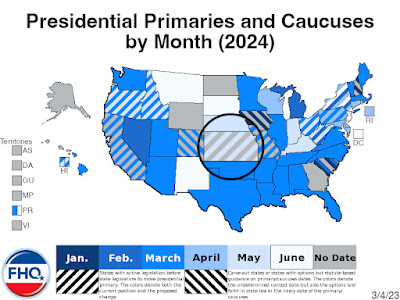The push to reinstate the Missouri presidential preference primary finally got its day before committee on Wednesday, March 22. The House Special Committee on Public Policy heard testimony on two identical bills to put back in statute code that was eliminated as part of omnibus elections legislation that passed the General Assembly and was signed into law in 2022.
A few things quickly became clear in the course of the hearing. First, but for one opponent and a handful of informational witnesses, everyone in a long list of those providing comments -- from voters to state and county party chairs to statewide and local elections officials to union lobbyists -- was in favor of the move. Rep. Rudy Veit (R-59th, Cole), the sponsor of one of the bills (HB 347) leaned heavily into the idea of caucuses disenfranchising military and government personnel (fire, police, etc.) relative to the options available in a state-run primary election. The sponsor of the other bill (HB 267), Rep. Cyndi Buchheit-Courtway (R-115th, Jefferson) mentioned that she got into politics with a simple slogan, "fighting for our voices to be heard," an idea she said was violated with no presidential primary.
Notably, the leadership of both state parties -- Chair Nick Myers and Vice Chair Leann Green of the Missouri Republican Party and newly elected Missouri Democratic Party Chair Russ Carnahan -- supported the effort. Carnahan went so far as to say that hurting voters' ability to participate in the presidential nomination process would further erode perceptions about the legitimacy of elections.
Second, the costs of such an election -- a stand-alone March presidential primary -- were repeatedly raised. Rep. Veit and others cited the estimated $10 million price tag, but shrugged it off, saying it was the price of democracy. Secretary of State Jay Ashcroft (R) in his testimony noted that the cost would not come out of one year of the budget but be spread across four.
And while Ashcroft did not speak for or against the legislation, he urged lawmakers to "pick one," caucuses or a primary. But he also made a point, talking about the presidential primary, to say that he was "philosophically" against holding a vote that does not matter. The secretary did not mean that the March election would fall too late in the calendar. Rather, he wrongly suggested that the primary has no bearing on either delegate allocation or selection in Missouri; that delegates are not bound.
[FHQ aside: Again, this is wrong. It is an impression that seems to have been forged during the 2012 cycle when Missouri lawmakers could not find a way to move or then cancel a primary that the Missouri Republican Party (who had the active nomination race that cycle) opted out of. The primary still occurred on the state's dime, but caucuses were where delegates were selected (and though unbound were largely committed to particular candidates). Missouri Republicans, however, did not operate in that manner during the last competitive cycle in 2016 (nor 2020 for that matter). The party allocated delegates based on the primary because RNC rules during that cycle mandated it and further backed up that binding in all states at the national convention.
Ashcroft also projects past Republican issues in Missouri onto Show-Me state Democrats, who do not and have not had those same problems as state Republicans because the process is more regulated at the national party level. But those problems have already been dealt with by the RNC.]
Finally, another theme that may end up affecting this legislation down the line was the idea of consolidating primaries. Elections officials in attendance and testifying described the difficulty of pulling off one presidential primary election in March only to have to turn around and do it all over again in April with nonpartisan local elections. But the same election administrators were cool to the notion of combining a partisan election with a nonpartisan election when it came up because of the impact it would have on correctly generating and distributing many different versions of a ballot to voters.
But if there is no state law requiring a primary, then none of this matters anyway. A state law would, of course, require elections officials, regardless of the burdens, to implement whatever state law calls for. And although a consolidated election may increase some headaches for elections officials across Missouri, it would both tamp down on the costs borne by the state and maximize turnout.
No votes were taken on either HB 267 or HB 347 in committee on Wednesday, but the hearing showcased some of the common tradeoffs involved in the presidential nomination process.
Related:
--
Recent posts:










